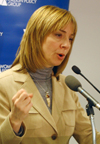Egypt: How a Virtual Revolution Became Actual
Michele Dunne, Senior Associate, Carnegie Endowment for International Peace
Photos | Transcript | Video

Washington, DC—On February 22, 2011, Michele Dunne, Senior Associate of Carnegie Endowment for International Peace and the Editor of Arab Reform Bulletin, briefed WFPG on the revolution in Egypt and the democratic uprisings throughout the Middle East. Dunne outlined the socioeconomic and political conditions which laid the foundations for revolution: the youth bulge, increased access to information through internet and social media, and the concentration of political power in the hands of an individual who is not “accountable via the ballot box.”
Dunne traced the Egyptian revolution’s roots back a decade to the founding of the Egyptian Association for Change—known by its slogan kefaya, meaning “enough”—by protesters from the Second Palestinian Uprising in 2000 and the US invasion of Iraq in 2003. This non-ideological movement brought together Egyptians from across the political spectrum to demand President Mubarak’s resignation. Although not successful, Kefaya played a critical role in breaking the taboo against protesting Mubarak’s rule. Starting in 2006, Egyptians became increasingly frustrated with the lack of change and workers began protesting in reaction to failed neoliberal economic reform programs, culminating in the April 6th Youth Movement Facebook group and protests in 2008. Discontent continued to heighten in 2010, with succession debates and outrage over corrupt parliamentary elections. Dunne remarked that in December the “tinder was very, very dry in Egypt, and then we saw a spark leap from Tunisia.”
The Muslim Brotherhood’s role in the revolution has been highly publicized in the West, but Dunne cautions not to overestimate their influence at this time. The Brotherhood announced that they will not have a candidate in the upcoming presidential election. The Brotherhood’s positions towards the US, Israel, and the role of women are cause of particular concern to the US and the international community, but Dunne notes that “there is no way to exclude the Muslim Brotherhood from politics in Egypt and yet carry out democratization.”
Turning to Egypt’s future, Dunne asked participants to follow two key issues, when the Supreme Military Council will hold free and fair presidential and parliamentary elections and how Egypt will reform its economic system to attract investment. She asserts that Egypt must also address residual government corruption and the brutality of the internal security services, noting that, “if that doesn’t change, then nothing changes.” The US and the international community should also reevaluate its aid packages to balance military, economic, development, and democracy aid. Dunne emphasized that it is crucial for the region’s stability that Egypt makes a successful democratic transition and is able to recaptures its lost leadership in the Arab world.